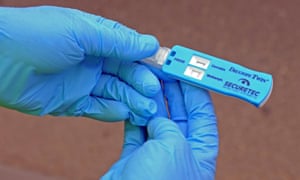Experts say policy not eligible for clinical trial status because participants are not giving consent
The Morrison government’s welfare drug-testing trial is so “fatally
flawed” it could not be used to “scientifically inform” a future
national rollout, a Senate inquiry has been told.
As the Coalition seeks the support of the Senate to drug test 5,000 people on Newstart and Youth Allowance in three trial sites, health and drug treatment experts lashed the proposal at a hearing in Canberra on Wednesday, arguing the government was proceeding in the face of all available evidence.
“The organisations are unanimous in their opposition to this drug-testing trial,” said Adrian Reynolds of the Royal Australasian College of Physicians.
“This sends a clear message that our government is not listening to those with relevant expertise.”As the Coalition seeks the support of the Senate to drug test 5,000 people on Newstart and Youth Allowance in three trial sites, health and drug treatment experts lashed the proposal at a hearing in Canberra on Wednesday, arguing the government was proceeding in the face of all available evidence.
“The organisations are unanimous in their opposition to this drug-testing trial,” said Adrian Reynolds of the Royal Australasian College of Physicians.
The government says it has proposed a world-first trial to gather evidence of whether the mandatory testing is an effective way to tackle drug use among welfare recipients and the prime minister, Scott Morrison, has said he was personally “puzzled” by the opposition to the plan.
But experts say the policy would not be granted clinical trial status by universities because participants could not be seen to have given their consent to be tested.
As part of the trial, Newstart applicants will be told to come into a Centrelink office for a meeting as part of their application. They will be told in person that they must agree to an on-the-spot drug test for their income support claim to proceed.
“The proposed trial will not accurately test the feasibility or effectiveness of the proposed measures,” Reynolds told the inquiry on Wednesday.
“And its results will be unable to scientifically inform any proposed national rollout because it is fatally flawed in its design.”
The trial was revived earlier this year and its passage through the Senate now hinges on the support of Jacqui Lambie, who has said she is open to the proposal but wants to see evidence that treatment services are adequate. A $10m treatment fund has been promised as part of the trial.
On Wednesday senators heard from drug and alcohol experts that existing services were stretched with hundreds of thousands unable to get treatment, while social service organisations and local authorities complained that they had not been consulted about the plan.
Officials from the Department of Social Services said they could not say which testing methods would be used – either urine, hair or saliva – until they had contracted third-party companies to carry out the tests.
They also declined to provide the cost of the overall program, which they said was commercial-in-confidence.
The Greens senator, Rachel Siewert, said: “We’re supposed to be voting on this legislation and you can’t tell us what approach you’re going to take and you can’t promise it will meet the gold standard.”
But Nathan Williamson, the Department of Social Services deputy secretary, said one of the reasons the program was designed as a trial was to “look at the different techniques”.
“The provider will have to meet the Australian standards,” he said.
The department expects 420 to 450 of the 5,000 people tested to fail the first test while 90 to 120 are expected to fail a second test across the sites at Logan in Queensland, Bankstown in New South Wales, and Mandurah in Western Australia.
Those who fail a test will be placed on the Basics Card, which quarantines part of their welfare payments, while people who test positive twice will be referred to treatment.
The Basics Card, which is already in place in those trial sites, is being phased out in the Northern Territory for the cashless debit card, which the government has claimed is superior.
Representatives from the Workplace Drug Testing Association, which represents about 80% of the businesses that offer services in Australia, said that saliva and urine testing costs $100-$150 per person for on-site collection and initial screening and $150-$200 for laboratory testing.
By and large, workplace drug testers did not carry out “observed” urine testing, the inquiry was told.

No comments:
Post a Comment